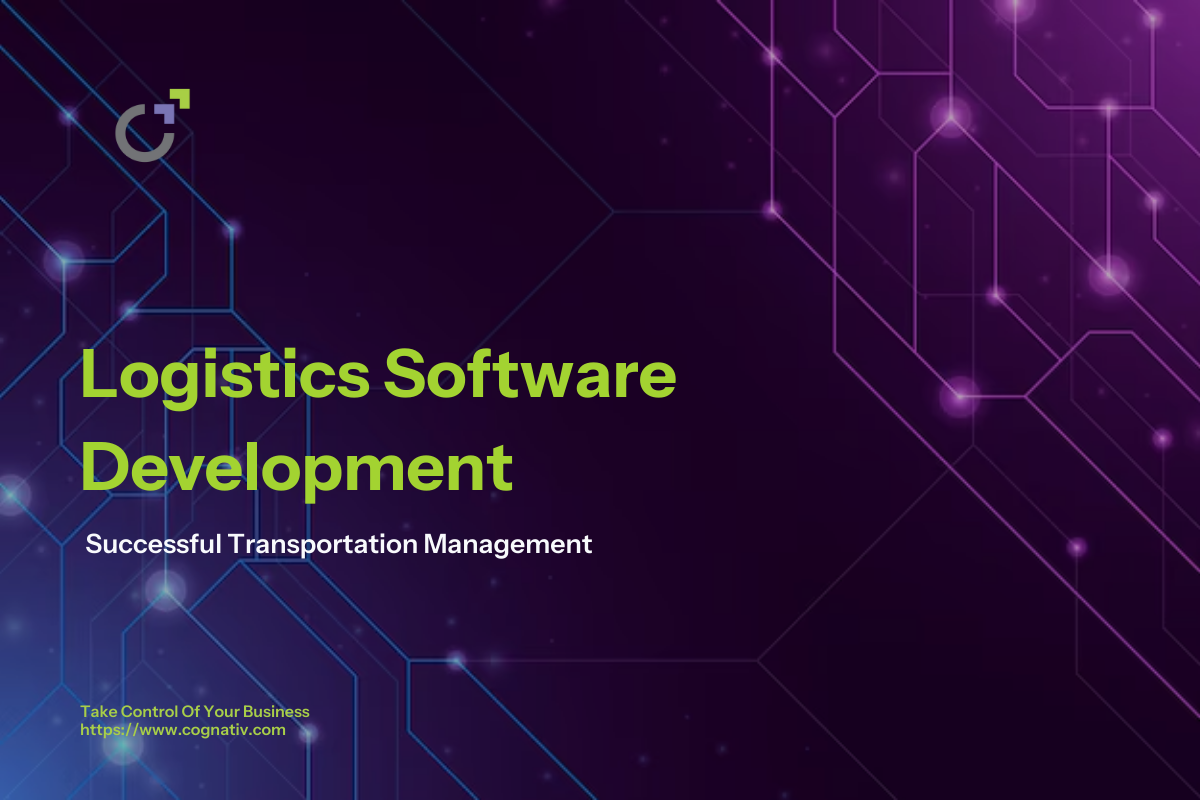

Saturday, March 22, 2025
Kevin Anderson
Logistics Software Development for Successful Transportation Management
The global logistics and transportation sector is under relentless pressure to deliver goods faster, cheaper, and more reliably. To keep pace, forward-thinking businesses rely on logistics software development to handle supply chain operations, optimize routes, and enhance real-time visibility. Whether you oversee freight forwarding, warehousing, or last-mile delivery, a custom logistics solution can provide the efficiency gains and cost savings necessary to remain competitive.
In this guide, we’ll explain the fundamentals of creating logistics and transportation software, discuss popular features and challenges, and highlight how an experienced logistics software development company can support you in achieving successful transportation management in 2025 and beyond.
Table of Contents
- Why Logistics Software Matters
- Key Functions of Logistics and Transportation Software
- Benefits of Custom Logistics Solutions
- Challenges in Logistics Software Development
- Choosing a Logistics Software Development Company
- 5 Steps to Building a Custom Transportation Management System
- Technology Trends in Logistics for 2025
- Sample Use Cases & Success Stories
- Frequently Asked Questions
- Conclusion

Why Logistics Software Matters?
The sheer scale of modern supply chains—often spanning multiple geographies, transport modes, and service providers—demands sophisticated IT solutions. With increasing global competition and consumer expectations for fast, reliable delivery, logistics software has become a strategic asset. A robust transportation and logistics platform can dramatically optimize operations by:
- Optimizing routes and schedules: Advanced algorithms reduce travel time and fuel consumption.
- Enhancing real-time visibility: GPS-based tracking and instant alerts keep all stakeholders informed.
- Automating routine tasks: Order confirmations, invoicing, and cargo scanning can be streamlined to reduce manual errors.
- Improving data accuracy: Integration with warehouse management systems (WMS), CRMs, ERPs, and partner APIs centralizes information and enhances decision-making.
By harnessing technologies like cloud computing, big data analytics, and IoT, logistics software transforms the traditional supply chain into an agile, data-driven process. This enables companies to not only reduce operational costs but also respond quickly to disruptions, ensuring customer satisfaction and competitive differentiation.
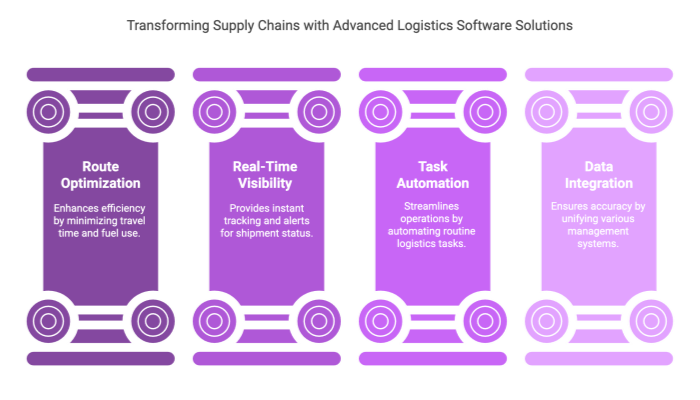

Key Functions of Logistics and Transportation Software
Logistics and transportation software is designed to handle complex supply chain operations by centralizing and automating key processes. Core functions include:
- Transportation Management System (TMS): Facilitates route planning and optimization, carrier selection, shipment scheduling, tracking, and performance reporting.
- Warehouse Management System (WMS): Manages inventory tracking, automated picking and packing, RFID/barcode scanning, and slotting optimization to enhance warehouse efficiency.
- Freight Forwarding Modules: Supports multi-leg transportation management, customs documentation, compliance tracking, real-time cost estimation, and collaboration among shippers, carriers, and customs brokers.
- Analytics & Reporting: Offers interactive dashboards that display metrics such as cost per mile, fill-rate, and performance KPIs. These tools also support predictive modeling to adjust routes or negotiate rates dynamically.
By integrating these functions, a comprehensive logistics solution enables end-to-end management of the supply chain, reducing operational complexity and improving decision-making based on real-time data.
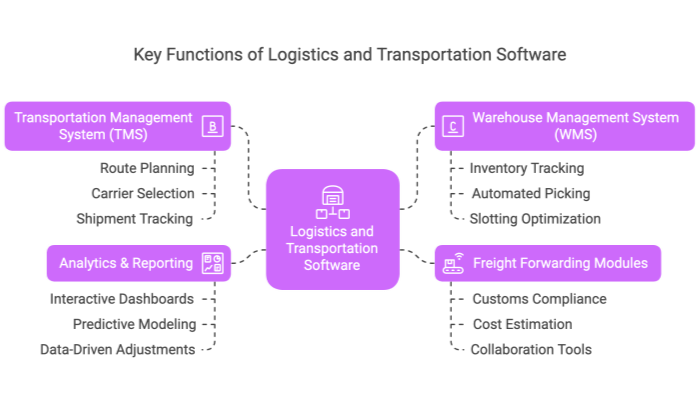

Benefits of Custom Logistics Solutions
Custom logistics solutions offer a range of benefits that off-the-shelf products simply cannot match. By tailoring the software to specific business needs, organizations can unlock significant operational and strategic advantages. Key benefits include:
- Automated Processes: Reduced manual data entry minimizes errors and frees up staff to focus on strategic initiatives.
- End-to-End Visibility: Real-time cargo tracking and event notifications provide comprehensive transparency across the supply chain, ensuring proactive management of shipments.
- Cost Optimization: Detailed analysis of shipping routes and truck capacities can reduce transportation expenses by 5–10%, directly impacting the bottom line.
- Improved Customer Service: Faster deliveries, accurate ETAs, and automated notifications build trust and enhance client satisfaction.
- Scalability and Flexibility: Custom platforms can be expanded with new modules or adjusted to meet growing operational complexities, ensuring long-term viability.
These tailored solutions enable businesses to achieve higher efficiency, better data accuracy, and improved profitability, ultimately delivering a strong return on investment.
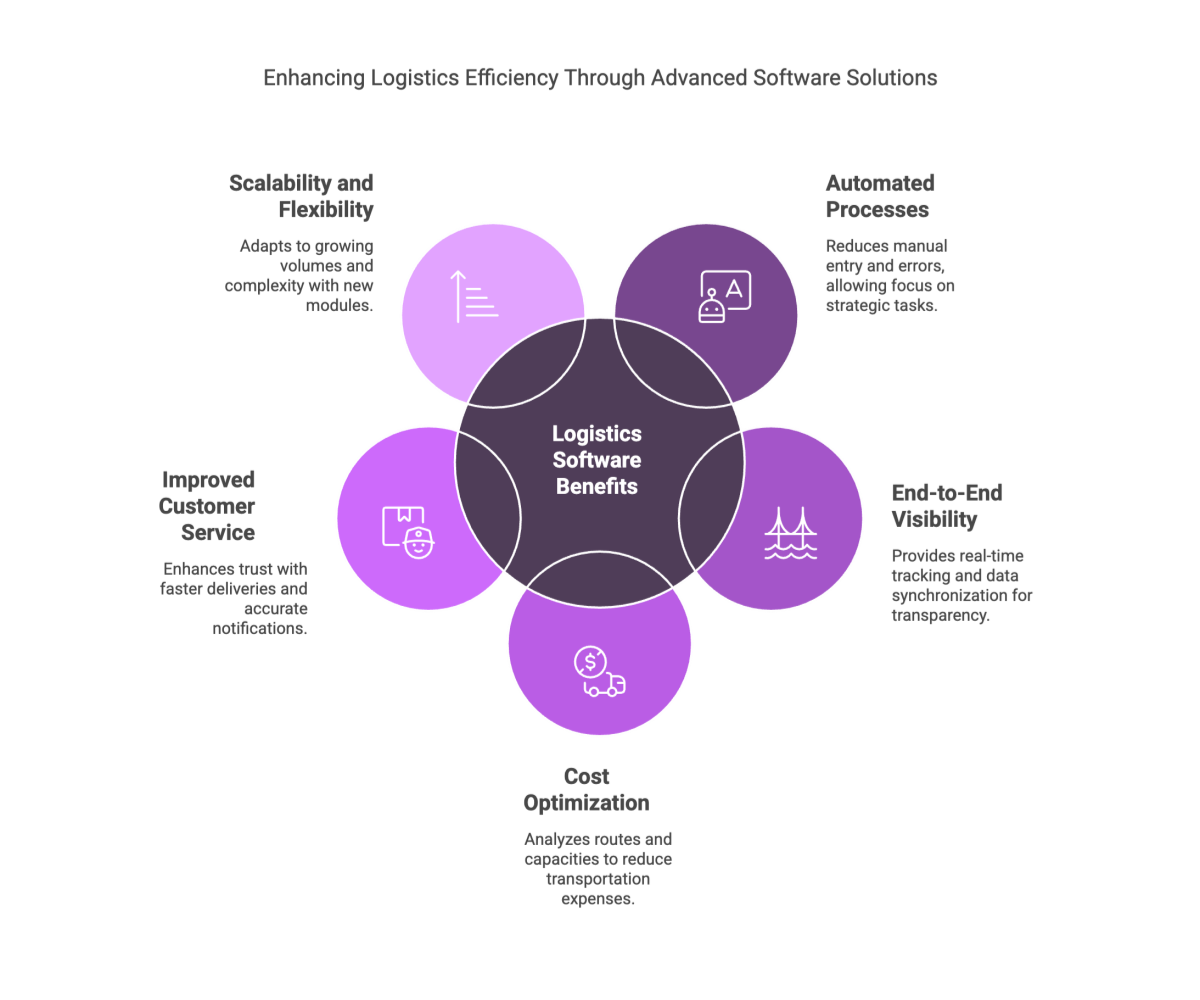

Challenges in Logistics Software Development
While custom logistics software can transform operations, developing such solutions comes with its own set of challenges. Key challenges include:
- Security and Data Protection: Systems handle sensitive shipping documents, invoices, and client data. Robust encryption, role-based access, and strict compliance with regulations (e.g., GDPR) are essential to safeguard information.
- Complex Integrations: Integrating legacy systems, ERP platforms, partner APIs, and third-party tools (such as route optimization engines) is often complex and requires meticulous planning to provide a unified, seamless experience.
- Scalability: Peak seasons or unexpected surges in demand require systems that can handle high volumes of data and transactions without performance degradation.
- Real-Time Tracking and IoT: Processing and analyzing massive data streams from GPS devices, driver apps, and IoT sensors in real time demands advanced architectures and sophisticated data processing capabilities.
- Changing Regulations: Compliance with varied transport laws, safety standards, and cross-border trade regulations is a moving target that requires the software to be adaptable and frequently updated.
Addressing these challenges necessitates a deep understanding of both technical and business requirements, as well as a commitment to ongoing maintenance and evolution of the software solution.
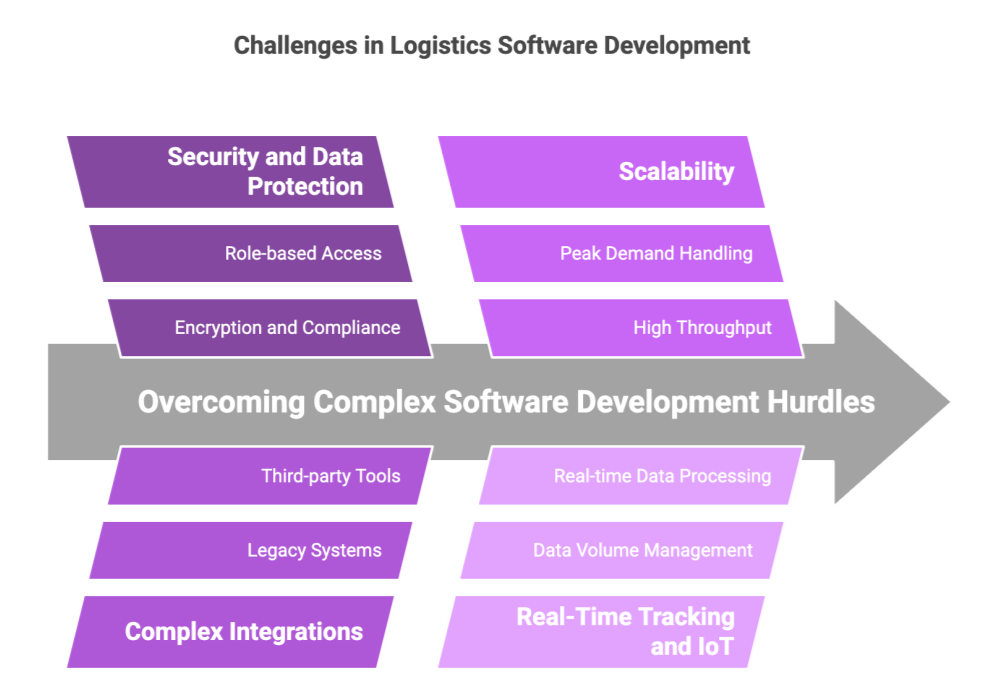

Choosing a Logistics Software Development Company
Selecting the right partner for logistics software development is critical to achieving a smooth, value-rich outcome. When evaluating potential vendors, consider these factors:
- Industry Knowledge: Look for a company with proven expertise in logistics and transportation, evidenced by domain-specific references and case studies.
- Technical Expertise: Ensure they are experienced with real-time tracking technologies, microservices architectures, cloud integration, and robust security practices.
- API and Integration Mastery: The ability to seamlessly integrate with carriers (such as UPS, FedEx, DHL), eCommerce platforms, and major ERP systems is crucial.
- Security & Compliance: Evaluate their data protection measures, encryption standards, and adherence to relevant regulations (e.g., GDPR, HIPAA).
- Communication & Culture: A partner that demonstrates clear communication, agile processes, and a collaborative culture will ensure smoother project execution.
- Scalability & Support: Consider their capacity for ongoing maintenance, quick bug fixes, and support for future expansions.
By carefully assessing these criteria, you can choose a development partner that not only understands your industry but also aligns with your long-term strategic goals.
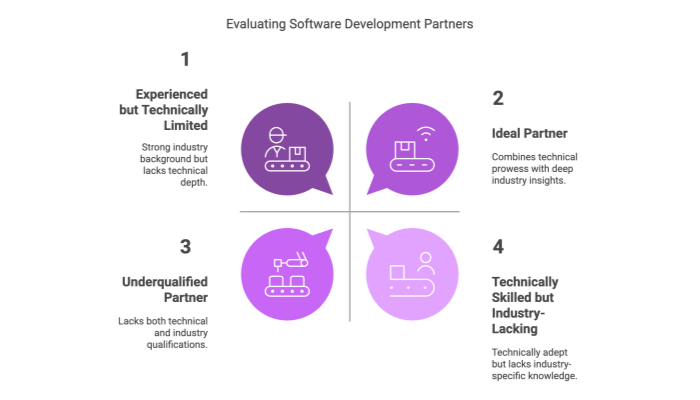

5 Steps to Building a Custom Transportation Management System
Building a custom transportation management system (TMS) involves a structured process that ensures the final product meets both operational needs and strategic objectives. Here are five key steps:
1. Discovery & Requirements
Identify core logistics needs such as route optimization, cross-docking, and multimodal shipping. Set clear success metrics like cost per mile, on-time in full (OTIF) delivery, and real-time shipment visibility. This phase is critical to understanding the unique challenges your business faces.
2. Planning & Technology Selection
Select an appropriate system architecture—whether microservices or a monolithic design—and choose the right programming languages and frameworks. Evaluate hosting options (such as AWS or Azure) to ensure your system can scale on demand. This stage lays the technical foundation for your solution.
3. Design & Prototyping
Develop detailed user journey maps for dispatchers, drivers, and carriers. Create wireframes or clickable prototypes and gather feedback from domain experts. This iterative design process ensures that the solution is user-friendly and aligned with operational workflows.
4. Development & QA
Implement modular features in sprints while integrating essential tools such as telematics and route calculation engines. Conduct rigorous quality assurance, including load testing and device compatibility checks for mobile applications used by drivers.
5. Deployment & Iteration
Roll out a minimum viable product (MVP) to selected regions or lanes for user testing. Use performance metrics and user feedback to refine the system, and plan for ongoing enhancements like advanced analytics or cross-border compliance features.
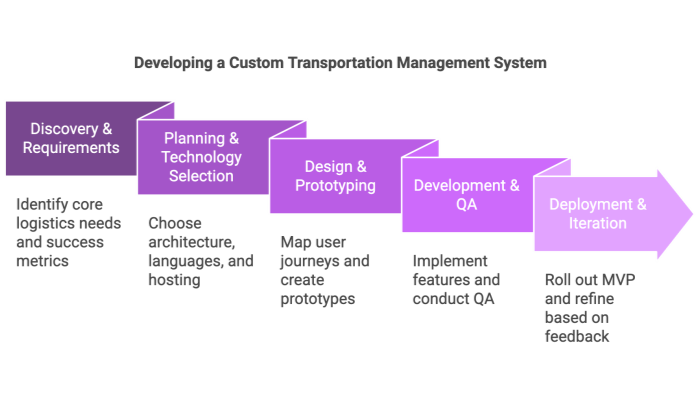

Technology Trends in Logistics for 2025
Innovative technologies are reshaping the logistics landscape, offering new ways to enhance transportation management. Some key trends include:
- AI and Predictive Analytics: Machine learning models enable demand forecasting, dynamic route adjustments, and risk detection, such as anticipating port strikes.
- Autonomous Vehicles & Drones: Emerging technologies in automation are revolutionizing last-mile delivery, particularly in areas with high traffic or limited infrastructure.
- Blockchain-Based Tracking: Tamper-proof ledgers enhance the authenticity of shipping documents and streamline cargo handoffs through secure, transparent record-keeping.
- Warehouse Robotics: Automated guided vehicles (AGVs) and robotic picking systems are transforming warehouse operations, improving speed and accuracy.
- Sustainability and Green Logistics: Innovations in emission monitoring, eco-friendly route planning, and electric fleet management are driving sustainable practices in transportation.
These trends not only improve operational efficiency but also offer competitive advantages by enabling proactive management of logistics challenges in a rapidly evolving market.
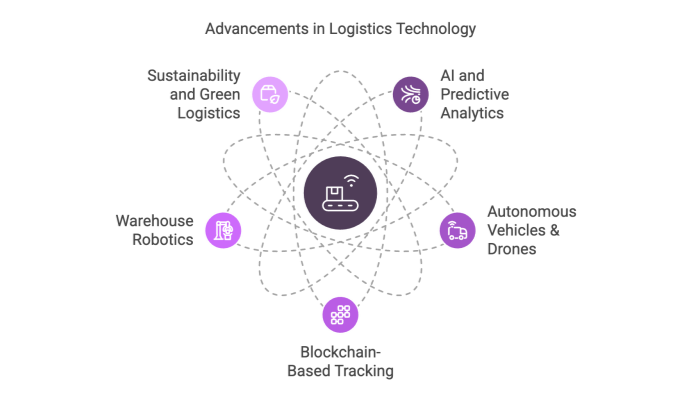

Sample Use Cases & Success Stories
Real-world examples demonstrate the transformative impact of custom logistics software:
- Case 1: Route Optimization for Parcel Delivery: A global delivery provider integrated a custom TMS with real-time traffic and local restriction data, cutting fuel usage by 12% and reducing delivery delays by 40%.
- Case 2: Freight Forwarding App: A mid-sized freight company replaced manual spreadsheets with a digital platform for container tracking, automating customs documentation and cost estimates to save $150K annually.
- Case 3: Integrated Warehouse & Transport System: A third-party logistics (3PL) provider unified warehouse data with truck dispatch systems, decreasing loading times by 25% and significantly reducing administrative paperwork.
These success stories illustrate how custom solutions can address specific operational challenges, streamline processes, and generate tangible cost savings.

Logistic Software Development Frequently Asked Questions
This section addresses common queries about logistics software development:
- What Is Logistics Software Development? – It is the process of creating custom solutions (including TMS, WMS, and fleet tracking apps) that streamline supply chain operations, improve data accuracy, and optimize transportation efficiency.
- How Do I Pick a Logistics Software Development Company? – Look for industry expertise, a strong technical portfolio, robust security measures, agile collaboration practices, and clear cost and support structures.
- Which Features Are Core to a Transportation Management System? – Essential modules include route planning, carrier selection, shipment scheduling, real-time asset tracking, cost estimation, and analytics dashboards.
- What Are the Biggest Challenges in Logistics Software Development? – Key challenges involve ensuring data security, integrating with legacy systems, handling high-volume transactions, and adapting to changing regulations.
- How Much Does a Custom Logistics Solution Cost? – Costs vary widely; simpler TMS modules may range from $30,000 to $70,000, while comprehensive systems for global operations can exceed $200,000, with additional expenses for maintenance and advanced features.

Conclusion
Logistics software development has the power to revolutionize how freight forwarders, carriers, retailers, and manufacturers manage their operations. Custom solutions streamline delivery processes, optimize routes, ensure data integrity, and modernize the entire supply chain. Whether you aim to unify disparate systems, accelerate shipping times, or reduce operational costs, a robust logistics platform is essential in today’s competitive environment.
By focusing on clear objectives, choosing the right engagement model, and emphasizing continuous improvement through agile methodologies, businesses can achieve long-term sustainable growth. A tailored logistics solution not only boosts operational efficiency but also provides the strategic flexibility required to adapt to market changes and emerging technologies.
In a rapidly evolving digital landscape, partnering with an experienced logistics software development company can give your organization the competitive edge it needs. With a custom-built platform, you can meet today’s challenges head-on while paving the way for a future-proof, agile supply chain.

Get in Touch With Us
At Cognativ, we specialize in building custom software solutions that drive operational excellence and sustainable growth. Our team of experts is dedicated to understanding your unique logistics challenges and designing systems that deliver real value. Whether you need to optimize your supply chain, enhance real-time tracking, or integrate complex workflows, we’re here to help you transform your operations.
If you’re ready to elevate your logistics capabilities and gain a competitive edge in today’s fast-paced market, contact us today. Let’s work together to develop a solution that meets your specific needs and paves the way for long-term success.
